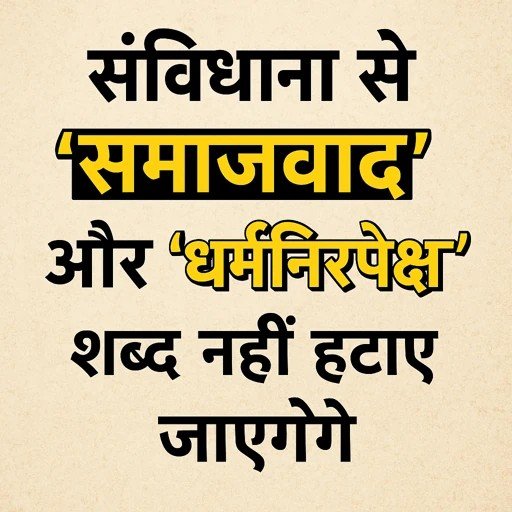The words 'socialism' and 'secularism' will not be removed from the Constitution: Protecting the real spirit of democracy
The words 'socialism' and 'secularism' will not be removed from the Constitution: Protecting the real spirit of democracy
🔸 'Socialism' and 'secularism' in the Preamble: What is the controversy?

The words "socialist" and "secularism" were added to the Preamble of the Indian Constitution in 1976 under the 42nd Constitutional Amendment. This step was taken by the Indira Gandhi government during the Emergency.
Ever since these words were added to the Constitution, there has been a demand by some groups and organizations to remove them. They argue that the Constitution makers did not originally add them.
But recently both the Government of India and the Supreme Court have clarified that there are no plans to remove these words from the Constitution.
🔸 Soul of the Constitution: What is 'socialism' and 'secularism'?
👉 Meaning of Socialism:
Socialism in India means —
equal distribution of resources,
economic justice,
removal of poverty,
equal opportunities to all sections.
It ensures social and economic justice for the weaker sections of the society. It has been seen as a guiding principle in the Indian Constitution.
👉 Meaning of Secularism:
Secularism in India means “equal respect for all religions”. India is not a religious nation and does not give preference to any one religion.
The government neither promotes any religion nor suppresses any religion. All citizens have the fundamental right to religious freedom.
🔸 Historical Background: When and why were these words added?
In 1976, the 42nd Constitutional Amendment added these two words to the Preamble:
“We the people of India, to constitute India into a sovereign, socialist, secular, democratic republic…”
This amendment came at a time when the Emergency was in force in the country and many fundamental rights were suspended. The controversy over this amendment continues to this day, but it is also true that the basic nature of India has always been secular and of social justice.
🔸 Recent debate: Why did this issue arise again?
Recently a petition was filed in the Supreme Court demanding that the words ‘socialist’ and ‘secular’ be removed from the Preamble.
The petitioner argued that these words were not in the draft of the Constitution and adding them during the Emergency was undemocratic.
But while hearing this petition, the Supreme Court made it clear that:
“There is no justification for removing these words and they are in accordance with the basic spirit of the Constitution.”
🔸 Government's stance: No intention to remove
The Government of India also filed an affidavit in the Supreme Court and clarified that
"There is no proposal or intention to remove the words 'socialism' and 'secularism' from the preamble."
This statement puts an end to all the speculations that were expressing apprehension of tampering with the basic spirit of the Constitution.
🔸 Experts' opinion: Why are these words necessary?
In the opinion of constitutional experts, academics and jurists in India:
✅ Socialism - guarantees social security and equal opportunity for the poor and the deprived.
✅ Secularism - is helpful in maintaining India's multi-religious and diverse culture.
✅ Both these words - are part of the "Basic Structure Doctrine" of the Constitution, which no amendment can eliminate.
🔸 Opposition and public sentiment
Majority of citizens and many political parties are against the removal of these words.
They believe that if socialism and secularism are removed, it will:
undermine India’s secular identity,
endanger the safety of weaker sections,
and increase social inequality.
🔸 Conclusion: Protecting the Constitution is the duty of every citizen
The Constitution of India is not just a legal document but a reflection of the country’s social, political and cultural values.
Words like ‘socialism’ and ‘secularism’ are not only its identity but also reflect its core purpose.
Any argument to remove these words is not only impractical but also against the basic principles of Indian democracy.
Therefore, it is imperative that we protect these values, understand them and pass on their importance to future generations.